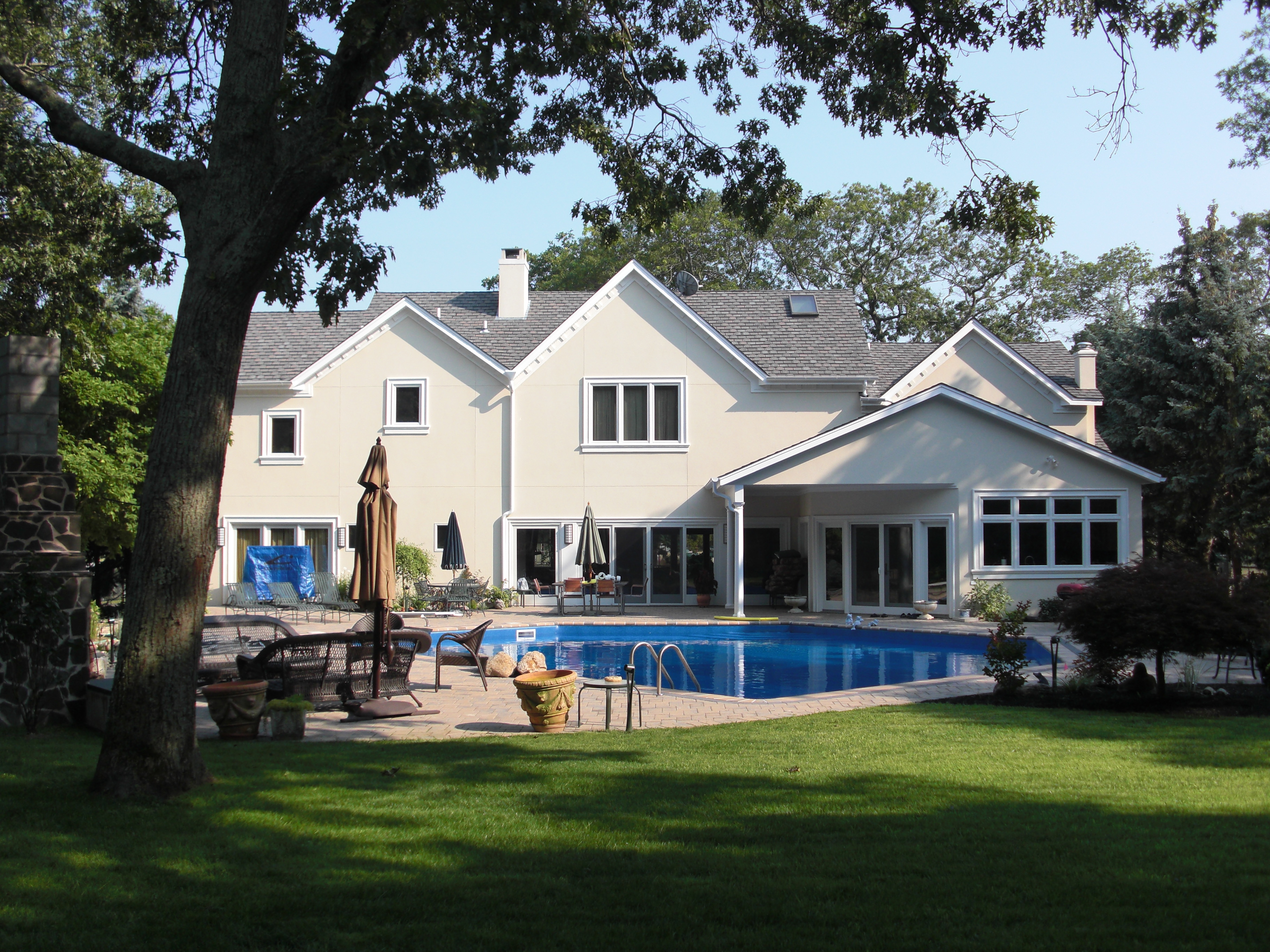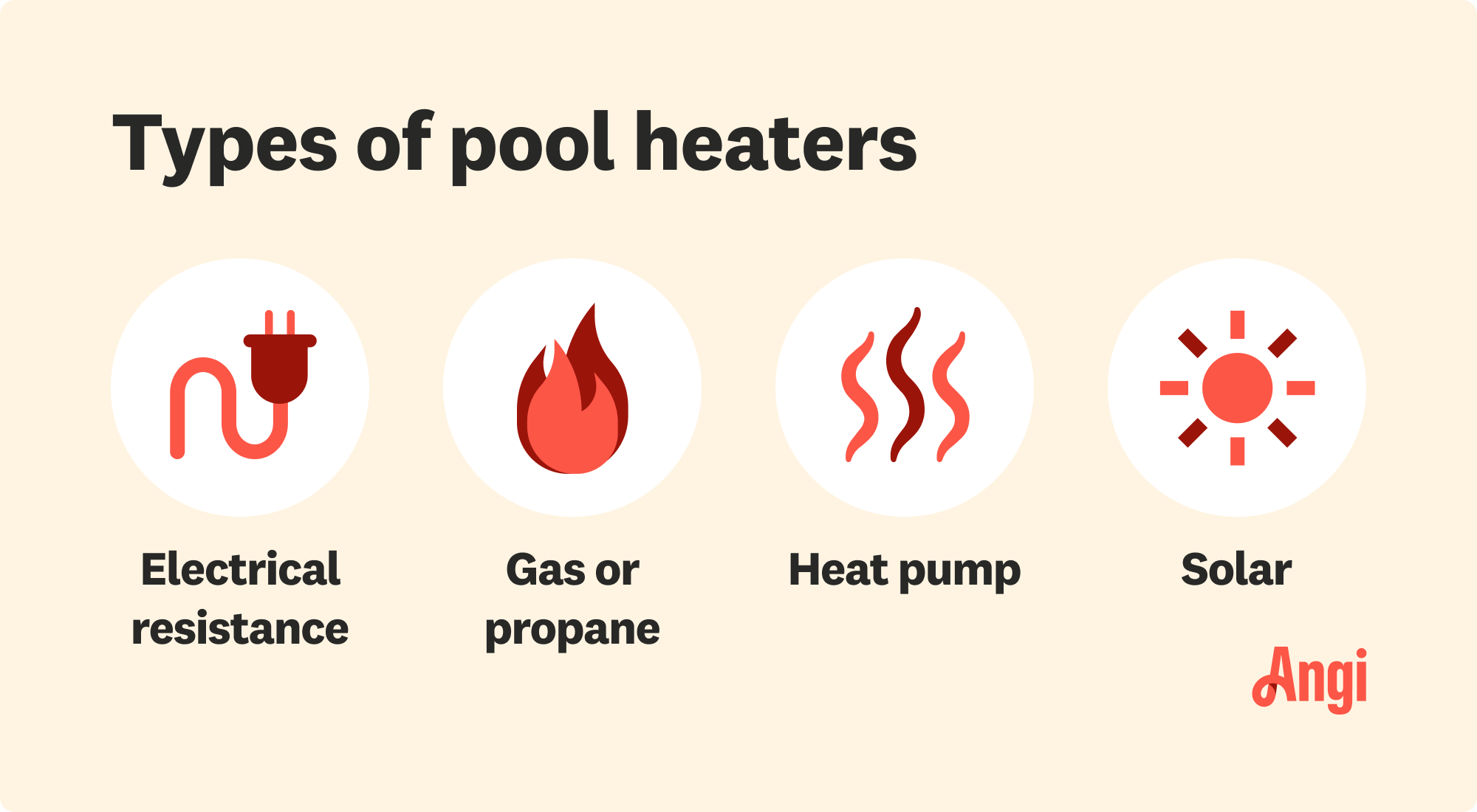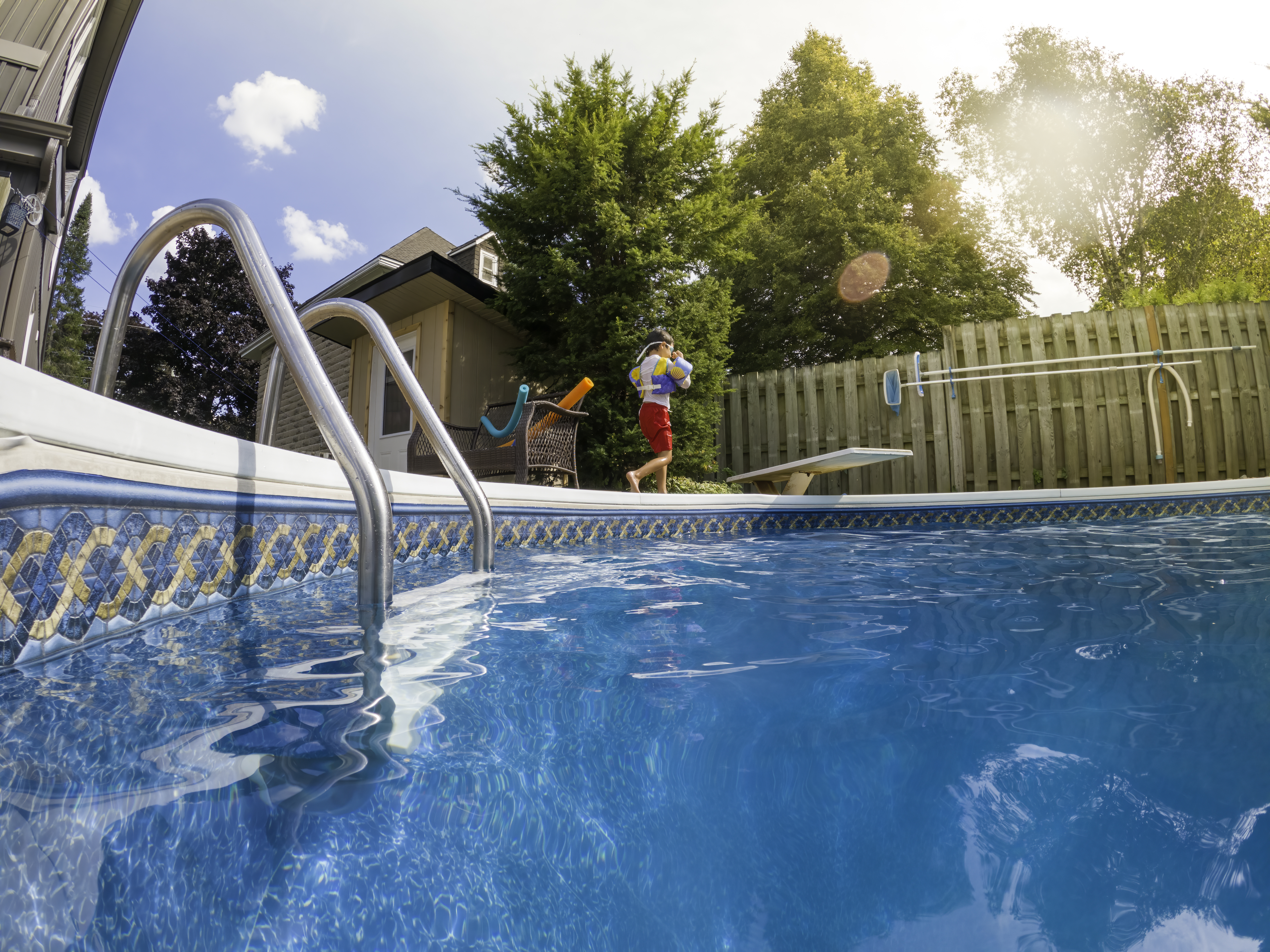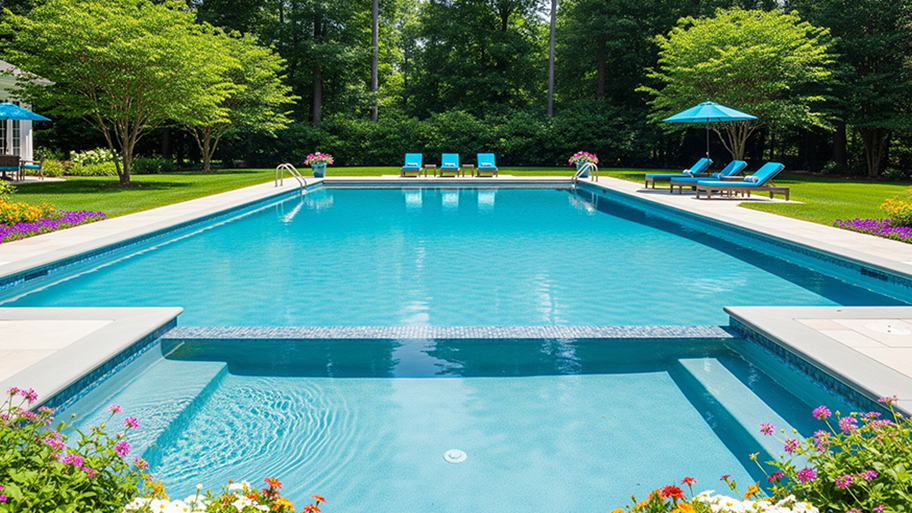
An inground pool offers endless fun in the summer, so if you're considering it for your home, read up on average inground pool costs in New York.
Pool heater costs average $3,000 but range from $1,830 to $4,217 depending on the type, size, and accessibility. A pool heating pro can assess your pool and provide an estimate.


Pool heaters vary widely based on your fuel type, the size of your pool, and your existing utility lines.
If you’re installing a new heater, your price will include running utility lines, installation, and the heater itself.
Homes in sunny states like Florida should consider a solar water heater, which has a higher up-front cost but will save you plenty down the road.
It costs anywhere from $120 (heat pump) to $850 (propane) to heat your pool per month, depending on fuel type.
Make sure to winterize your machine every year to extend its lifespan.
Don’t let the weather ruin your swimming routine. The average pool heater cost is $3,000, but most homeowners pay between $300 and $5,750 to have one installed. Costs will fall on the high end if you choose to install a large, efficient solar pool heater.
Installing a pool heater is the best way to maximize your pool usage, even during the cooler months. Below, we break down the top factors that impact the cost of a new pool heater so you can get back to the water.

The cost of installing a pool heater is not a one-size-fits-all solution. A few things will affect the job's total price, including the pool size and which utilities are available in your area. Most of the time, even if utilities are available, you will need to run new lines. The information below will help you budget for a pool heater installation.
There are many different types of pool heaters at various price points. You can expect to spend between $1,000 and $9,500, including labor. Keep in mind that different heaters run on different types of energy. Sometimes, homeowners end up trading an inexpensive installation for long-term energy costs. Below, we explore the various types of pool heaters available and their impact on the overall project cost.
| Pool Heater Type | Average Cost, Installed | Qualities |
|---|---|---|
| Gas or propane | $1,500–$6,000 | Best for quickly heating pools with low installation cost. |
| Electric resistance | $1,000–$6,000 | Affordable up front cost but costs more on average to run. |
| Solar | $2,500–$9,500 | Best used in sunny climates and won’t drive up energy bills. |
| Heat pump | $2,500–$7,500 | Energy efficient but slow to heat the entire pool. |
This is the most common type of heater design for both in-ground and aboveground pools. Gas or propane fuel these heaters and are generally considered inexpensive to source and install. Expect to pay between $1,000 and $4,500 for the heater itself and $500 to $1,500 for labor.
Installing a heater when the pool is being constructed could save you some money. Talk to your contractor as you calculate the cost of building an aboveground pool.
Gas heaters can typically connect to a preexisting gas line, while a propane heater needs a standalone tank. The monthly energy cost when using one of these heaters will be high, so keep that in mind.
This type of heater is relatively inexpensive to install but will demand high amounts of electricity when in use. Electric resistance pool heaters use resistance coils to warm up the water and work best in small pools and climates above 55 degrees Fahrenheit. Electric pool heaters will cost $500 to $5,000, and labor will cost $500 to $1,000.
This is the most cost-effective solution to heating a pool, but you can only use a solar pool heater in areas that receive consistent direct sunlight. If you live in warmer states like Florida or Arizona, this could be a good choice, though the same cannot be said about colder states like Minnesota and Colorado.
Solar pool heaters cost $2,000 to $7,500 for the unit itself and an additional $500 to $2,000 for labor. Though they have a higher upfront cost than gas heaters, your energy bill will be virtually nonexistent, especially when you pair them with a solar pool cover.
This type of pool heater extracts hot air from the atmosphere and uses it to warm the water. The upfront costs will be higher than some other types of pool heaters, as heat pumps need a dedicated electric circuit to operate.
The heat pump itself will cost $2,000 to $6,500, with labor costing $500 to $1,000. These heaters are relatively energy efficient, which is great for your utility bill, but they are slower to heat than gas models.
When you work with an aboveground or hot tub pool heater, you are outside and, well, above the ground. This factor makes installing aboveground pool heaters less costly than an in-ground pool option. An in-ground pool heater may incur extra costs in terms of labor and materials because of the digging required to hide the pipes.
Saltwater pools use the same type of heaters as traditional chlorine or bromine pools.
Choosing the right size pool heater is a crucial step in the buying process. It’s important not to cut corners by buying a pool heater that is too small—this will only cause the heater to work harder than necessary to keep up with the pool's volume. Unfortunately, over time, this will cause your pool heater to suffer unnecessary wear and tear, causing the need to repair or replace it. Speak with a pool heater installer near you to narrow down the exact size you need.
| Pool Volume, Gallons | Average BTU Range Needed, Gas Heater | Average Cost, Installed |
|---|---|---|
| 10,000 | 40,000–60,000 | $1,000–$2,500 |
| 15,000 | 60,000–90,000 | $1,500–$3,500 |
| 20,000 | 80,000–120,000 | $2,000–$3,500 |
| 25,000 | 100,000–150,000 | $2,500–$4,000 |
| 30,000 | 120,000–180,000 | $4,000+ |
Location plays a role in the cost of a heater for a couple of reasons. First, some areas of the United States might only have certain utilities readily available, like gas hookups or electrical lines. If you live in a more rural area without accessible utilities, propane might be the only option.
Second, climate matters. Homeowners in warm climates need less energy to heat their pools and can opt for less powerful heaters. Those in sunny climates also typically have solar heaters as an option.
Most homeowners will need to install utility lines to operate their new pool heater. Depending on the type of pool heater you choose, you might need to have a gas line, water line, or electrical circuits installed to keep your water warm. If you’re unsure if you’ll need a line installed, talk to your local pool technician.
| Utility Type | Installation Cost Range |
|---|---|
| Gas lines | $500–$2,000 |
| Electrical circuits | $250–$2,100 |
| Water lines | $350–$1,900 |
The more labor required, the more your pool heater installation will cost. It also depends on the type of contractor. For example, most qualified electricians cost $50 to $100 per hour, whereas the cost of a plumber could range from $45 to $200 per hour, depending on skill level.
If you are replacing a preexisting pool heater, you will have to pay a small fee. This could cost anywhere from $25 to $50, but most pros will add these removal fees to the new pool heater installation cost. Some contractors will even perform this service for free if you put in a brand-new unit.
Not every pool heater installation requires a permit, but roof-mounted solar options will. Additionally, if you need to run a gas line to power your heater, you can expect to need a permit. Your professional pool heater installer will let you know if a permit is required during your initial consultation. Permit costs vary by region but run between $100 and $500.
Installing a pool heater can make a pool more comfortable and inviting, but it definitely adds to the cost of running a pool, especially if you choose a propane or electric resistance pool heater. In addition to ongoing energy costs, pool heaters require upkeep, maintenance, and winterization in areas with colder winters.
One of the most significant cost factors when it comes to pool heaters is the monthly energy bill. Each heater type works differently, so each will impact your utility bill to varying degrees.
| Type of Heater | Cost Range to Heat Pool (Monthly) |
|---|---|
| Gas Line | $200–$400 |
| Propane | $200–$850 |
| Electric Resistance | $175–$600 |
| Heat Pump | $120–$200 |
| Solar | $0–$10 |
There are a few ways you can prolong the lifespan of your pool heater and keep monthly costs down.
Pool heater maintenance and repairs are necessary to keep it working properly. Maintenance requires keeping the heater clear of debris and periodically checking for rodent activity. Contact an exterminator if you notice rodent damage, like droppings or chewed wires.
To maintain the pool heater, you will also need to keep the proper pH balance and winterize it properly. You can hire a pool installation company to do a regular maintenance check and complete any necessary repairs.
While properly winterizing your pool heater can add to your heated pool cost, it will also keep it in good condition longer and make it easier to operate each summer. Proper winterization includes:
Following the manufacturer’s instructions for winterization
Removing water from the pool heater, pipes, pump, and filter to prevent it from freezing and damaging these elements
Closing gas valves for a gas pool heater
Opening winterization ports or drain cocks
Turning off electricity to the pool and heat pump
Removing drain plugs
Checking heat pump throughout the winter to remove any debris and check for damage from rodents
You can also consult a pool maintenance professional to ensure the pool heater is winterized correctly.
These options allow you to run your heater less, saving money on energy bills and putting less wear and tear on the heater.
Pool cover: A simple pool cover will help retain heat and should reduce energy costs by 50% to 90%. It will cost between $650 and $2,200 to buy and install one.
Solar blanket: These coverings tend to feature a multitude of air bubbles on the exterior that trap heat released via direct sunlight. The blanket transfers this heat to the pool’s water. If you live in a sun-drenched area, a solar blanket can help reduce monthly energy costs by up to 75%. Installing a solar blanket will cost between $50 and $500.
Pool enclosure: Building a pool enclosure can be a fantastic choice for colder climates, as it essentially turns the pool’s location into another room in the house. You can expect to save oodles on your monthly energy bill with a pool enclosure, but installation is pricey at $5,000 to $14,000.
Installing a pool heater often requires running new electrical, water, or gas lines, and is a job best left to a local pool heater pro. Some pool heaters also have installation requirements that necessitate hiring an electrician or plumber (or both). Labor rates depend on the type of professional, but you can rest assured knowing your pool heater was installed properly.
A pro will do the following to ensure the pool heater is installed the right way:
Pool techs can recommend the right size for your pool heater based on the size of your pool.
They’ll assess the utility lines you currently have to determine pool heater options.
Electricians can safely run electrical lines and hook them up to the pool heater.
Plumbers can run water lines and gas lines to ensure a proper connection.
Pool heater installers understand permitting requirements and help obtain any necessary permits.
Relying on a qualified professional is the best way to make sure the pool heater is installed properly, but there are a few things you can do to make the process more efficient and cost-effective:
Ensure the existing heater or the location for the new heater is easily accessible by removing patio furniture, toys, or decorations.
Clear the area of shrubs or trees.
Have the utility company mark the location of existing utility lines.
Many factors of pool heater installation costs are fixed, meaning there’s not much you can do to reduce expenses. In addition to the cost of the heater itself, you likely cannot skip out on the cost of professional labor. That said, there are ways to shave money off the final price tag. It just takes some strategic planning.
Autumn is the best time to buy a pool heater if you want a deal. Most homeowners work on their pool in the spring, so it is ready when the weather gets warm enough to swim. By the time autumn rolls around, pool companies are wrapping up their busy season and may offer sales and discounts to drum up additional work.
High-efficiency heaters cost more upfront, but if you use your pool heater often, you could actually end up saving money in the long run. For example, heat pumps can save you anywhere from $950 to $4,800 per year in energy costs compared to gas or electric resistance pool heaters. Solar heaters save even more since they cost less than $120 per year to run.
Most homeowners need to install some utility lines when they put in a heater, but you can save thousands by working with what you already have. If there is a readily available gas line, go with a gas heater. If you already have an outdoor electrical circuit, go with an electric resistance heater or heat pump.
Keep in mind that propane heaters are sometimes an exception. Depending on the situation, it could cost up to $850 per month to run this type of heater. In this case, you may actually save money by installing a utility hookup, so run the numbers before you buy.
If you are building a new pool, do not wait to install a heater. You can save money if you do both jobs at the same time. Often, grouping together smaller contracting jobs saves cash compared to doing each job individually.
Be prepared to discuss the different types of pool heaters with your pool technician to determine which one best fits your needs and budget.
Ask questions about the up-front costs versus the ongoing costs of running the pool heater.
Inquire about additional costs, such as landscaping after the project is completed or permitting fees.
Home is the most important place on earth, which is why Angi has helped more than 150 million homeowners transform their houses into homes they adore. To help homeowners with their next project, Angi provides readers with the most accurate cost data and upholds strict editorial standards. We survey real Angi customers about their project costs to develop the pricing data you see, so you can make the best decisions for you and your home. We pair this data with research from reputable sources, including the U.S. Bureau of Labor Statistics, academic journals, market studies, and interviews with industry experts—all to ensure our prices reflect real-world projects.
Want to help us improve our cost data? Send us a recent project quote to [email protected]. Quotes and personal information will not be shared publicly.
From average costs to expert advice, get all the answers you need to get your job done.

An inground pool offers endless fun in the summer, so if you're considering it for your home, read up on average inground pool costs in New York.

Regular pool liner replacements are key to a properly maintained pool. Find out the average cost of pool liner replacement in New York City.

A pool remodel can bring new life to your yard. Weigh the average pool remodel costs in New York so you can plan accordingly.

Baking soda is a budget-friendly way to tackle DIY pool maintenance. Our guide explains how to add baking soda to a pool.

If you own a pool, you may wonder: how many gallons in my pool? Read on for our pool volume calculator to learn how much water is in your swimming pool.

Dreaming of getting in those daily laps without tearing up your backyard? Here’s what to know about endless pool costs so you can plan your project.